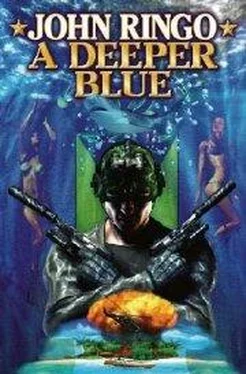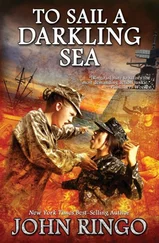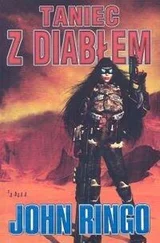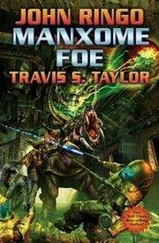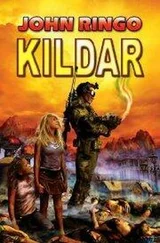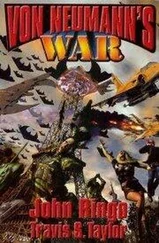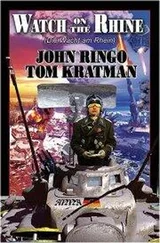A Deeper Blue
by John Ringo
This is a work of fiction. All the characters and events portrayed in this book are fictional, and any resemblance to real people or incidents is purely coincidental. This book and series have no connection to reality. Any attempt by the reader to replicate any scene in this series is to be taken at the reader’s own risk. For that matter, most of the actions of the main character are illegal under US and international law as well as most of the stricter religions in the world. There is no Valley of the Keldara. Heck, there is no Kildar. And the idea of some Scots and Vikings getting together to raid the Byzantine Empire is beyond ludicrous. The islands described in a previous book do not exist. Entire regions described in these books do not exist. Any attempt to learn anything from these books is disrecommended by the author, the publisher and the author’s mother who wishes to state that he was a very nice boy and she doesn’t know what went wrong.
For the poor bastards, male and female, guarding the thugs in Guantanamo, stuck in paradise doing pretty close to the world’s crappiest job. This one’s for you, folks.
And, as always:
For Captain Tamara Long, USAF
Born: 12 May 1979
Died: 23 March 2003, Afghanistan
You fly with the angels now.
As usual I’d like to thank RingTAB, the Ringo Technical Advisory Board, for help on keeping the technical details of this book somewhat close to accurate. In addition I’d like to thank William Ringo, former Army chemical weapons instructor and current FEMA contract safety officer for help with both chemical weapons details and safety response.
Last, but certainly not least, I’d like to thank my daughters, Jenny and Lindy, for helping Daddy research details of South Florida culture, and Miriam, for her usual able support.
No more will my green sea go turn a deeper blue
I could not foresee this thing happening to you.
If I look hard enough into the setting sun
My love will laugh with me before the morning comes.
— Rolling Stones
“Paint it Black”
The freighter rolled eastward on easy swells, but nothing was easy about the task.
It might have helped if some of the crew were handling the winch, but they were all below under strict orders to forget anything unusual had occurred. And even stricter orders to keep quiet if they did remember. The crew wouldn’t talk, though. They were all good Islamics and supported the jihad. What was more, they knew that if any word of this event got out, their families as well as themselves would pay the penalty.
So Ibrahim had to keep an eye on it all. He had carefully instructed the fedayeen on the plan, but nothing beat experience. And he was the only one with experience. He’d shipped out on boats just like this in his youth, escaping the hell of the Karachi slums. And over time he had worked his way up to bosun, the senior deck worker of a ship. It was then he came to the attention of the Movement.
The Movement often needed cargo shifted around and it had ships aplenty. What it did not have was enough trustworthy people who knew the ins and outs of how to move cargo… covertly. Oh, there were many such but there were never enough. Guns, rockets and ammunition, women and drugs to pay for the weapons, people, there were so many things the Movement needed… moved.
This mission, though, was so complicated Ibrahim could only hope any of it went right. But he only had to ensure this one small part. And that was difficult enough.
The offshore speed boat he was lowering touched the waves and Ibrahim slowed the winch. The massive boat, nearly fifteen meters long, was big and tough but it wouldn’t take it well if the waves slapping the ship’s side overwhelmed it or it slammed into the freighter’s hull.
Hiding the damned things had been bad enough. If Ibrahim had had his way the boats would have been locally purchased; there were many such in the area. It would have been a joke straight from Allah to buy them from the American government. The Americans often seized such boats running drugs in this area and just as often sold them back to the drug runners at auction.
Instead, these had been purchased in Europe, shipped in one of the many freighters owned by the Movement to Africa, transferred to another and transferred again to Ibrahim’s ship, carefully secured out of sight in the hold. The transfer had been effected in West Africa in a port notorious for its lax customs. If anyone had noticed the midnight transfer no word had come to the Movement.
Now it was Ibrahim’s job to get the damned thing into the water without it smashing against the side of the moving ship or being swamped by a wave.
It was down and he waved to the men on the boat to unhook. They had better get that one right; if one of them slipped over the side they were likely to be crushed between the two vessels. And even if they were not, the ship was not going to stop. Once this boat was in the water it could pick up anyone overboard. Until then, though…
The fedayeen, though, did the job right. Allah knows, Ibrahim had been careful enough in his instructions. First the young man, a Yemeni with some small boat experience, started the engine and unhooked the rear connection. Very important. If he’d unhooked the front, the boat would have spun in place and probably swamped or been pulled under the ship. Starting the engine was only good sense before casting off. Only when it was free did he make his way forward, carefully crawling over the broad, flat expanse of the front surface, and unhook the front connection. They were both fast connections with lanyards to release them. The front connection was under massive tension and sprung back with a twanging sound, striking the side of the ship hard enough Ibrahim knew he’d need to check it before the next boat was released.
It took nearly an hour before the five boats were in the water, following the ship in a long string; then came the last, and strangest, part.
A crew of fedayeen had been working on one of the surface containers, a standard shipping container carried on the deck. The fedayeen had fitted the container with a set of pontoons and a cable. The cable was attached to a massive steel plate.
The steel plate had to be suspended over the side, first, then the container swung out.
Ibrahim couldn’t handle both of the winches for this one. The commander of the mission was on the main crane, holding up the container, while Ibrahim handled a smaller crane that lifted the plate. With both of them swung over the side, the ship was listing by nearly seven degrees, but it wouldn’t stay that way long.
Ibrahim released the connections on the steel plate and it splashed into the water, the cable attached to the bottom of the container spinning out furiously. A bare moment later the container splashed into the briny deeps, floated for a moment on the surface, supported by its pontoons, then was snatched under like a fishing bobber. All that was left was a trail of bubbles.
“You have done well, Ibrahim,” the commander of the fedayeen contingent said as the bosun climbed out of the seat of the winch.
The fedayeen commander was strange. He wore the proper dress and prayed five times a day as the Prophet decreed. But his eyes were gray, unusual in a believer, and sometimes he seemed more European than Middle Eastern for all his dark skin and hair. Little things you’d only notice on a long voyage, but telling.
“Thank you, Haj,” Ibrahim replied, breathing in relief. “Go with God.”
“And you as well,” the man said, drawing a pistol. “Go with God.”
Читать дальше
